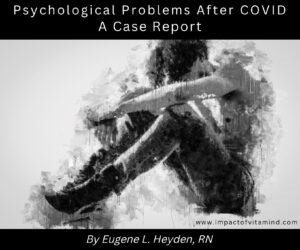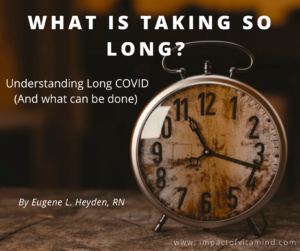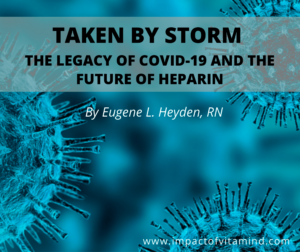Last update: 12-23-24
By Eugene L. Heyden, RN
“The mast cell is a complex immune cell that in its mature form resides in the tissues that interact with the external environment such as the air passageway, skin, and gastrointestinal tract. While best known for its central role in allergy, anaphylaxis, and asthma, mast cells primarily function in host defense to bacteria, parasites, and viruses.” ~ Hamilton, 2018
“Individuals with long COVID-19 are confounded with multiple organ system dysfunctions, long-term organ injury sequelae, and a decreased quality of life.
“There is an activated condition of mast cells in long COVID-19, with abnormal granulation and excessive inflammatory cytokine release. A study by Weinstock et al. indicates that patients with long COVID-19 suffer the same clinical syndrome as patients with mast cell activation syndrome (MCAS).” ~ Sumantri and Rengganis, 2023, emphasis added
“Long-COVID symptoms disappeared completely in 29% of treated patients. There was a significant improvement in each of the considered symptoms (improved or disappeared) in all treated patients, and the improvement grade was significantly greater in treated patients compared to
controls.” ~ Salvucci et al., 2023, emphasis added
Let’s get right down to business.
Thankfully, something important that has not gone unnoticed: There is a striking similarity between the symptoms of Long COVID and the symptoms of another disease known as Mast Cell Activation Syndrome (MCAS). Indeed, they look almost identical and may be the same disease—with COVIID leading to long COVID wherein a state wherein the activation of the mast cell becomes persistent and problematic. This observation could help many individuals get the help they need. Listen up!
“An observational study conducted by Weinstock et al. shows that patients with long COVID-19 have virtually identical mast cell activation symptoms and severity as previously diagnosed MCAS patients without long COVID-19. Notable similar symptoms in long COVID-19 compared with MCAS patients are physical weakness, brain fog, tachycardia, insomnia, shortness of breath, migraines, paresthesia, arthralgia, dizziness, eye complaints, nasal complaints, tinnitus, dry mouth, constipation, easy bruising, flushing, vertigo, wheezing, bone pain, weight loss, rashes, abdominal pain, and skin lesions.” (Sumantri and Rengganis, 2023, emphasis added) Sounds like a few people I know. Continuing . . .
“Our data confirm that histamine receptors blockade may be an effective target to successfully treat long-COVID. Our finding supports the underlying role of MCA [Mast Cell Activation] in the pathophysiology of long-COVID. … “Patients treated with antihistamines showed a significantly better response than the 23 untreated patients.” (Salvucci et al., 2023, emphasis added)
Now if you are a physician who is sufficiently aware of MCAS and knows how to effectively treat it—and are sufficiently aware of the similarity between Long COVID and MCAS—you just might be inclined treat the Long COVID patient sitting right in front of you along the following lines:
“Patients [with Long COVID and controls, patients without Long COVID] were treated with fexofenadine (180 mg/day) and famotidine (40 mg/day).” Treatment here was not with exotic, expensive drugs, it was with the common, reasonably priced antihistamine Allegra (fexofenadine) and the common, very affordable antihistamine Pepcid (famotidine).
So, how did it all turn out?
“Fatigue, brain fog, abdominal disorders, and increased heart rate were evaluated in treated and untreated patients at baseline and 20 days later. Results: Long-COVID symptoms disappeared completely in 29% of treated patients. There was a significant improvement in each of the considered symptoms (improved or disappeared) in all treated patients, and the improvement grade was significantly greater in treated patients compared to controls. No significant differences in the outcomes were observed in the controls.” (Salvucci et al., 2023, emphasis added)
Well, that’s enough for me! If I had Long COVID, I would ask my physician for a therapeutic trial of Alegra and Pepcid, in keeping with the above treatment example, and see what happens. What would I have to lose? Of course, I would not take “No” for an answer. I am very persuasive.
Assuming I was successful in my request and therapy was in progress, should my response to the therapeutic trial outlined above be not as satisfying as anticipated, I might consider requesting the addition of another common medication to the treatment plan. In the treatment of MCAD, to calm down the inappropriately-activated the mast cell, the drug montelukast (Singular) could be added to the regime. (see Sumantri and Rengganis, 2023) This measure just might be effective in the treatment of my Long COVID. What would I have to lose?
And there are things that do I could do on my own, available without prescription, that may give me an edge. I could add quercetin, vitamin C, and curcumin to the treatment plan—all compounds known to bring calm to the mast cell. (see Hamilton, 2018) Of course, medical supervision required. Additionally, a gluten-free diet may be of help, as gluten has been shown to stimulate the mast cell (Hamilton, 2024).
In conclusion, let me share the following conclusion:
“Our data confirm that blocking both H1 and H2 receptors can lead to a quick improvement in patients with long-COVID with specific symptoms attributed to MCA. These findings support the underlying role of MCA in the pathophysiology of long-COVID.” (Salvucci et al., 2023, emphasis added).
I’ve done my part—sharing insights and the possibilities. Now, it’s up to you take it from here.
Related posts: (Click image to view)
References
Hamilton MJ. Nonclonal Mast Cell Activation Syndrome: A Growing Body of Evidence. Immunol Allergy Clin North Am. 2018 Aug;38(3):469-481. https://pubmed.ncbi.nlm.nih.gov/30007464/
Salvucci F, Codella R, Coppola A, Zacchei I, Grassi G, Anti ML, Nitisoara N, Luzi L, Gazzaruso C. Antihistamines improve cardiovascular manifestations and other symptoms of long-COVID attributed to mast cell activation. Frontiers in Cardiovascular Medicine. 2023;10. https://www.ncbi.nlm.nih.gov/pmc/articles/PMC10388239/
Sumantri S, Rengganis I. Immunological dysfunction and mast cell activation syndrome in long COVID. Asia Pacific Allergy. 2023 Mar 1;13(1):50-3. https://journals.lww.com/apallergy/Fulltext/2023/03000/Immunological_dysfunction_and_mast_cell_activation.8.aspx
Disclaimer: This article is presented solely for informational purposes. The information contained herein should be evaluated for accuracy and validity in the context of opposing data, new information, and the views and recommendations of a qualified healthcare professional. It should not be substituted for professional judgment and guidance or provide a reason to neglect or delay appropriate medical care. The reader, and the reader alone, is responsible for any action taken that could be construed as a response to the information contained herein. The statements and opinions expressed by the author have not been reviewed or approved by the FDA or any other authoritative body. This article is offered to the reader to broaden his or her understanding of the issues under consideration and to help identify options that may be suitable for the individual to pursue, on behalf of self or others, under physician approval and direction. The author and publisher offer no guarantees of the accuracy or validity of the quotations incorporated into this presentation or the accuracy or validity of the information presented by the resources that are herein recommended. All questions of a medical nature which arise from reading this article should be directed at qualified health care professional. There are no guarantees that a suggested website and internal links are safe to visit or open or are currently available.
Copyright © 2024 Eugene L. Heyden, RN
All Rights Reserved

DISCLAIMER: The book excerpts and articles featured on this website are offered solely for informational purposes. The information contained therein should be evaluated for accuracy and validity in the context of opposing data, new information, and the views and recommendations of a qualified health care professional, and not to be substituted for professional judgment and guidance or to provide a reason to neglect or delay appropriate medical care for self or for others. It is the reader and reader only who bears the responsibility for any actions that could be construed as being a response to the information presented. The statements and opinions expressed by the author or authors of the information provided on this website have not been reviewed or approved by the FDA or by any other authoritative body, nor is the author endorsing any product or specific therapy mentioned. The book excerpts, articles, statements, and opinions are offered to the reader to broaden his or her understanding of the issues discussed and to help identify options that may be suitable for the individual to pursue, on behalf of self or others, under approval and direction of a qualified physician or medical team member. All questions of a medical nature which arise from the book excerpts and articles available on this website should be directed at qualified health care professional.















